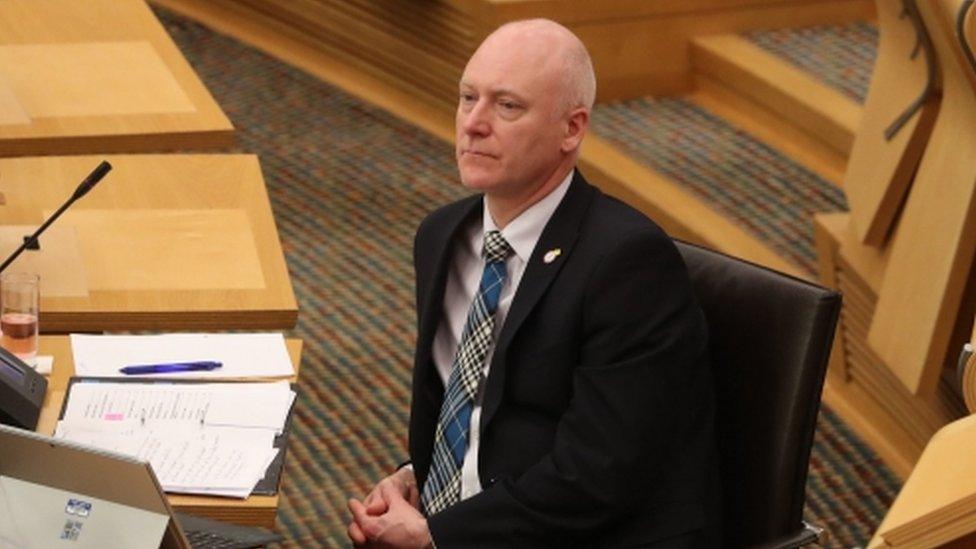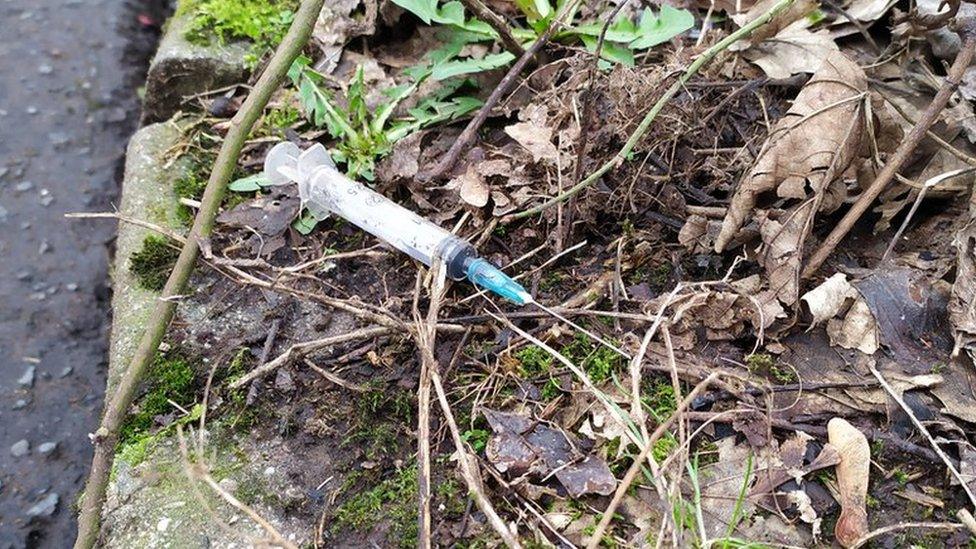'No shortcuts' to reducing record drug death rate
- Published

Opposition parties have called on Joe Fitzpatrick to resign over the record number of drug deaths
A Scottish government minister has said there is no easy path to cutting Scotland's record drug death rate as he rebuffed opposition calls to resign.
Figures published on Tuesday showed that 1,264 people died of drug misuse last year.
This gives Scotland the highest drug death rate in Europe - a level three times higher than England and Wales.
Public Health Minister Joe Fitzpatrick said the problem had been "decades in the making".
He said the high number of deaths "stem from a long-standing and complex set of challenges" and that there "really is no shortcut to suddenly solve this".
Mr FitzPatrick, who has been in the role since 2018, also pledged to "keep doing the job I am doing" despite claims from opposition parties that needs to be replaced.
The 1,264 deaths recorded last year was a 6% increase on 2018 and more than double the number of deaths in 2014.
It was the sixth year in a row that the country has seen a record number of deaths.
Mr Fitzpatrick told the BBC's Good Morning Scotland programme that the government had been "working really hard over the last number of years" to try to solve the problem.
And he pointed to a decision made in 2016 to start treating drug abuse as a public health issue rather than a criminal justice issue as a "major system-wide change we are continuing to work on".
He added: "I could not for a second suggest that I can turn this around - this has been decades in the making.
"I can't turn this around alone. It has got to be the whole of society and by the whole of society I mean everyone. We all have a role to play here.
"One of the biggest barriers to people seeking treatment is the stigmatisation which people get from the media, but also from friends and family and also from themselves.
"So we all need to work to make sure that we treat this as a health issue, as it actually is, and support people into recovery."

Scotland has a high number of people who have been using opioid drugs such as heroin for many years
Mr Fitzpatrick said one of the biggest challenges was the large number of people in the 35-54 age group who have been taking opioid drugs for many years, but who were not engaging with services to help them.
He added: "We need to change our services to make them more receptive, and that's the work that's going on just now".
The UK government, which has power over drug laws, has refused requests from the Scottish government to allow so-called safe consumption rooms to be set up as part of efforts to tackle the problem.
But critics argue that the Scottish government could do more with the powers over health and justice that it does have, and point out that England's drug death rate is far lower despite the country also not having consumption rooms.
'Letter of comfort'
There have also been suggestions that the Lord Advocate, Scotland's most senior law officer, could issue a "letter of comfort", which would allow consumption room to open in Scotland without fear of prosecution.
Mr FitzPatrick said it was not for him to tell the Lord Advocate what to do, and said the law officer had previously made clear in his evidence to a Westminster committee that the law needs to be changed.
He added: "The best thing would be for us to change the law to make sure that the current drugs law that covers UK or just Scotland is fit for purpose.
"The current legislation is so out of date and so many people have told the UK government that, and I am hopeful they will eventually make those changes".
Mr FitzPatrick was criticised by opposition parties for his performance when he faced questions over the Covid vaccine roll-out at Holyrood earlier this month, and there have been calls for Scotland to appoint a dedicated vaccines minister.
The release of the drug death figures led to fresh calls for his resignation, with Scottish Labour MSP Monica Lennon saying the minister had "tried his best, but it's not good enough".
She added: "The public needs to have confidence in the public health minister to lead us out of this human rights tragedy - these shocking statistics and his woeful response give us none.
"It's time to make way for fresh leadership and end this drugs crisis."